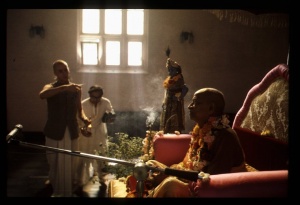BG 14.12: Difference between revisions
m (1 revision(s)) |
(Vanibot #0020 edit - link to the Version Compare feature) |
||
| Line 1: | Line 1: | ||
{{ | [[Category:Bhagavad-gita As It Is (1983+) - Chapter 14]] | ||
<div style="float:left">'''[[Bhagavad-gita As It Is (1983+)]] - [[BG 14 (1983+)|Chapter 14: The Three Modes Of Material Nature]]'''</div> | |||
<div style="float:right">[[File:Go-previous.png|link=BG 14.11]] '''[[BG 14.11]] - [[BG 14.13]]''' [[File:Go-next.png|link=BG 14.13]]</div> | |||
{{CompareVersions|BG|14.12|BG 1972|BG 1983+}} | |||
{{RandomImage}} | |||
==== TEXT 12 ==== | ==== TEXT 12 ==== | ||
<div class="devanagari"> | |||
:लोभः प्रवृत्तिरारम्भः कर्मणामशमः स्पृहा । | |||
:रजस्येतानि जायन्ते विवृद्धे भरतर्षभ ॥१२॥ | |||
</div> | |||
<div | <div class="verse"> | ||
:lobhaḥ pravṛttir ārambhaḥ | |||
:karmaṇām aśamaḥ spṛhā | |||
:rajasy etāni jāyante | |||
:vivṛddhe bharatarṣabha | |||
</div> | </div> | ||
==== SYNONYMS ==== | ==== SYNONYMS ==== | ||
<div class="synonyms"> | |||
<div | ''lobhaḥ''—greed; ''pravṛttiḥ''—activity; ''ārambhaḥ''—endeavor; ''karmaṇām''—in activities; ''aśamaḥ''—uncontrollable; ''spṛhā''—desire; ''rajasi''—of the mode of passion; ''etāni''—all these; ''jāyante''—develop; ''vivṛddhe''—when there is an excess; ''bharata-ṛṣabha''—O chief of the descendants of Bharata. | ||
</div> | </div> | ||
==== TRANSLATION ==== | ==== TRANSLATION ==== | ||
<div class="translation"> | |||
<div | |||
O chief of the Bhāratas, when there is an increase in the mode of passion the symptoms of great attachment, fruitive activity, intense endeavor, and uncontrollable desire and hankering develop. | O chief of the Bhāratas, when there is an increase in the mode of passion the symptoms of great attachment, fruitive activity, intense endeavor, and uncontrollable desire and hankering develop. | ||
</div> | </div> | ||
==== PURPORT ==== | ==== PURPORT ==== | ||
<div class="purport"> | |||
<div | |||
One in the mode of passion is never satisfied with the position he has already acquired; he hankers to increase his position. If he wants to construct a residential house, he tries his best to have a palatial house, as if he would be able to reside in that house eternally. And he develops a great hankering for sense gratification. There is no end to sense gratification. He always wants to remain with his family and in his house and to continue the process of sense gratification. There is no cessation of this. All these symptoms should be understood as characteristic of the mode of passion. | One in the mode of passion is never satisfied with the position he has already acquired; he hankers to increase his position. If he wants to construct a residential house, he tries his best to have a palatial house, as if he would be able to reside in that house eternally. And he develops a great hankering for sense gratification. There is no end to sense gratification. He always wants to remain with his family and in his house and to continue the process of sense gratification. There is no cessation of this. All these symptoms should be understood as characteristic of the mode of passion. | ||
</div> | </div> | ||
__NOTOC__ | |||
<div style="float:right; clear:both;">[[File:Go-previous.png|link=BG 14.11]] '''[[BG 14.11]] - [[BG 14.13]]''' [[File:Go-next.png|link=BG 14.13]]</div> | |||
__NOTOC__ | |||
__NOEDITSECTION__ | |||
Revision as of 19:52, 7 December 2017

A.C. Bhaktivedanta Swami Prabhupada
TEXT 12
- लोभः प्रवृत्तिरारम्भः कर्मणामशमः स्पृहा ।
- रजस्येतानि जायन्ते विवृद्धे भरतर्षभ ॥१२॥
- lobhaḥ pravṛttir ārambhaḥ
- karmaṇām aśamaḥ spṛhā
- rajasy etāni jāyante
- vivṛddhe bharatarṣabha
SYNONYMS
lobhaḥ—greed; pravṛttiḥ—activity; ārambhaḥ—endeavor; karmaṇām—in activities; aśamaḥ—uncontrollable; spṛhā—desire; rajasi—of the mode of passion; etāni—all these; jāyante—develop; vivṛddhe—when there is an excess; bharata-ṛṣabha—O chief of the descendants of Bharata.
TRANSLATION
O chief of the Bhāratas, when there is an increase in the mode of passion the symptoms of great attachment, fruitive activity, intense endeavor, and uncontrollable desire and hankering develop.
PURPORT
One in the mode of passion is never satisfied with the position he has already acquired; he hankers to increase his position. If he wants to construct a residential house, he tries his best to have a palatial house, as if he would be able to reside in that house eternally. And he develops a great hankering for sense gratification. There is no end to sense gratification. He always wants to remain with his family and in his house and to continue the process of sense gratification. There is no cessation of this. All these symptoms should be understood as characteristic of the mode of passion.